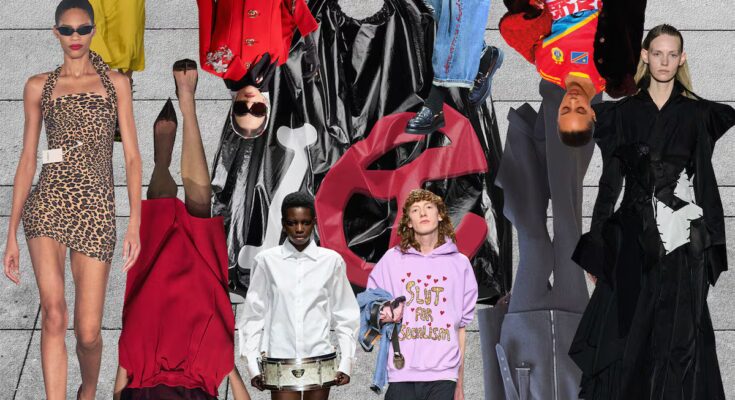“Fashion has become a joke. It’s all about money. Big companies are like kids playing soccer and running after a ball. They don’t think about consumers. They have so much money that they no longer need to work for it.” Yohji Yamamoto is singing. The venerable Japanese designer, the one who has repeatedly brought the clothes of the proletariat to the catwalk, is hurt by the current corporate ways of the clothing industry, as he confesses in the recent edition of BOF 500, the special newsletter dedicated to the most influential people in the sector that he publishes every year. The business of fashion. Tireless at 82, he however feels tired of dealing with an increasingly greedy system that lives only for profit, a situation which, in his opinion, generates anxiety.
He’s not the only one. “We are starting to get fed up with so much big business, so much big culture, so much global system. Even small things can be powerful,” Rei Kawakubo said through her husband and Comme des Garçons president, Adrian Joffe, presenting the company’s autumn-winter 2025-26 collection. A feeling that seems contagious: “I just wonder how to carry on when everything around you is trying to bring you down. I’m not trying to convince this industry that my way of doing things is better, I just want to show that it’s possible to approach it another way, from alternative positions,” says Ellen Poppy Hill, a graduate of London’s Central Saint Martins who made her debut last spring, outside the official calendar. “At first I followed the typical advice they give you in school: I rented a studio, I created my company, I registered my brand, I paid the required taxes and I left myself a pasture. Until I said enough: I don’t work like that, my creation doesn’t respond to that process, I won’t establish a business plan for 10 years”, says the young woman (27 years old), an emerging talent in which some have captured the radical spirit of Vivienne Westwood.
It had to happen: after a long decade of accommodation, lulled by the deceptive siren songs of a system that has seen its profits increase exponentially like never before, the winds of rebellion are blowing. And the best thing is that the angry air sweeps the house from the inside. To date, most of the calls for attention have been aimed at consumers, to buy less, but buy intelligently, in an attempt to break the vicious circle favored by fast fashion, first, and then by luxury fashion, following those dizzying production models in the name of economic advantages. Indeed, anti-capitalism as a sociocultural phenomenon associated with fashion continues to strike at our hearts as insatiable shoppers, as Tansy Hoskins insists in her Anti-capitalist fashion manual (which Captain Swing just reissued).
But the industry’s voices disavowing its precepts of seasonality, globality and entertainment suddenly sound louder and clearer. Also because it is no longer about design or creativity, but about an endless and boring parade of celebrities and people of supposed influence who wear imaginative clothes for a fee. “The industry treats us like pawns on a chessboard, which it moves and discards at will. It’s a grotesque dynamic that made me rethink certain things, like the idea of being a product rather than someone with an artistic vision and a story to tell,” says Charles Jeffrey, creator of Loverboy, perhaps the most political label on the British scene: this autumn-winter collection was staged in a ring, with the models – muses and friends – performing a choreography. tense and violent boxing. “An expression of resistance”, the creator defined it.
From the pioneer Elizabeth Hawes to Demna, passing through Helmut Lang and Miguel Adrover, the list of free radicals in fashion is not short, even if it is revealing: all, or almost all, have ended up giving in to the system. Experience shows that opposing it is costly. Even the corporate machine has its defense mechanisms; Remember the attempt at deceleration/humanization during the confinement and the production stoppage due to the covid pandemic, which ended up being neutralized by the same multinationals from which it was proposed. What happens when you are an employee and your job depends on how you behave in the bank accounts of a group of shareholders.
The question, of course, is whether one can be anti-system while still being part of it. “Most designers who we might consider critical or radical are firmly rooted in the system. They are neither anti-business nor anti-capitalist. However, their work seems to indicate otherwise, perhaps because they contradict the convention that fashion should be cheerful and frivolous, superfluous and decorative, and that it should not concern itself with social or political issues,” says Caroline Evans, professor emerita at Central Saint Martins and author of Fashion at its limits: entertainment, modernity and death (2003), a revealing essay on that generation of creators who, in the 1990s, dared to question the definition of fashion from within. “The Belgians set the standard. Dries Van Noten, Ann Demeulemeester or Martin Margiela were not anti-system, but they criticized it by challenging the concept of good taste, what is sexy, feminine or glamorous and all those stereotypes about what is appropriate or not. Even the Japanese, but we must not lose sight of what really moved them: Miyake, Yamamoto and Comme des Garçons have always sought success in an industry characterized by selling things. Otherwise, they would not be never gone to Paris,” says the academic, who isn’t exactly a fan of Hoskins’ manual. “It’s a well-conceived book, but as a critique of fashion in the sense of the industry and its production methods, not of fashion itself. It boils down to the debate on ethics and sustainability. What’s interesting is design as an anti-system practice,” argues Evans, who calls for the implementation of the critical perspective in fashion studies.
“We don’t have the numbers, but we count with our conscience,” said Alexandra Cánovas and Martaé Martínez, of the Murcian label Las Culpass. The brand, famous for its pencil cases and which applies criticism in its creative method, has completed three decades of feminist and anti-capitalist activism in fashion: “Starting a business is nice when you think you don’t have a boss to answer to and you can organize yourself as you want; what happens is that when you do it by working locally, thinking more about your values than capitalism, the numbers don’t work. The big sharks have the resources, and the small sardines have the talent. It’s not like that. a fair game, but with those “We have to respect the rules.”



